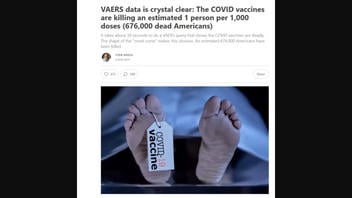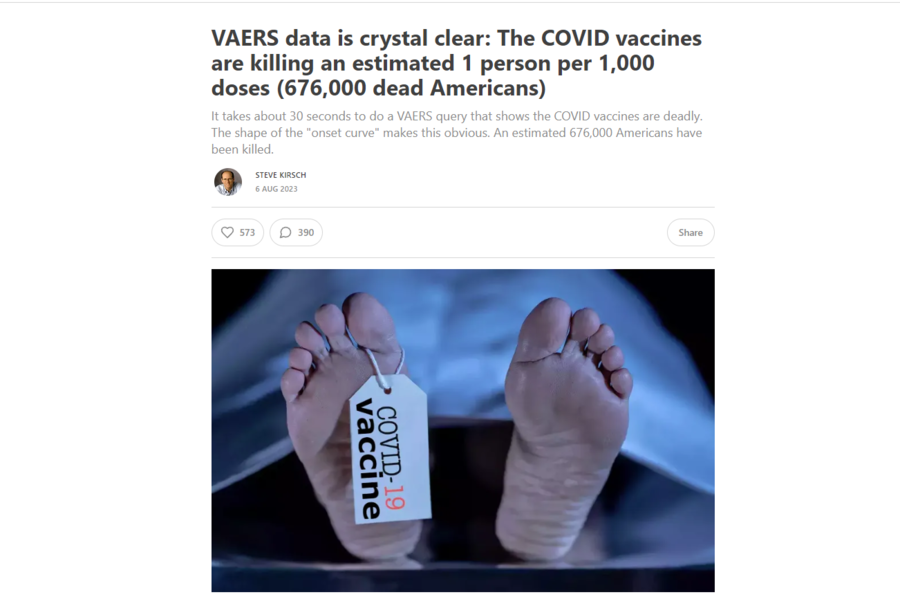Fact Check: VAERS Data Is NOT ‘Crystal Clear’ Proof That COVID-19 Vaccines Are Killing ‘1 Person Per 1,000 Doses’

Does data collected from the Vaccine Adverse Event Reporting System (VAERS) prove that COVID-19 vaccines are “killing an estimated 1 person per 1,000 doses,” resulting in “676,000 dead Americans”? No, that’s not true: The claim originated in a blog post by a known COVID misinformation spreader who used VAERS data in ways that medical experts have explicitly advised against. As VAERS, part of the Centers for Disease Control and Prevention (CDC), is a self-reported database, it serves as a reporting mechanism to detect “new, unusual, or rare vaccine adverse events.” It is not designed to determine if a vaccine caused a health problem. In addition, adverse vaccine reactions are not listed as a categorical cause of death by health officials.
The claim originated in a Substack blog (archived here) by Steve Kirsch, a known COVID misinformation spreader whom Lead Stories has previously fact checked. Posted on August 6, 2023, the post read:
VAERS data is crystal clear: The COVID vaccines are killing an estimated 1 person per 1,000 doses (676,000 dead Americans)
It takes about 30 seconds to do a VAERS query that shows the COVID vaccines are deadly. The shape of the ‘onset curve’ makes this obvious. An estimated 676,000 Americans have been killed.
Here is how the blog appeared at the time of writing:
(Source: Substack screenshot taken Sun Aug 6 23:55:00 UTC 2023)
VAERS is not designed to determine if a vaccine caused a health problem. As it is a self-reported database — meaning anyone can report a supposed event and such accounts are not validated by medical experts — it serves as a mechanism to detect “new, unusual, or rare vaccine adverse events.” VAERS is used as a trend spotter for health events, but not deaths. Adverse vaccine reactions are not a categorical cause of death tracked by U.S. health officials, a CDC spokesperson has told Lead Stories.
VAERS data is a tracking tool — it does not establish a causal relationship
VAERS serves as an “early warning system” that is co-managed by the CDC and the U.S. Food and Drug Administration to monitor the safety of vaccines after they are authorized for use in the U.S. Anyone can submit a report describing a possible health problem, also called an “adverse event,” to VAERS after vaccination. Because of this, a VAERS report cannot prove that a vaccine caused an event as such incidents have not been independently reviewed and confirmed by a medical professional, a CDC spokesperson told Lead Stories.
“Statements that imply that reports of deaths to VAERS following vaccination equate to deaths caused by vaccination are scientifically inaccurate, misleading, and irresponsible. COVID-19 vaccines are undergoing the most intense safety monitoring in U.S. history,” wrote an agency spokesperson in an email received on August 8, 2023.
“To date, CDC has not detected any unusual or unexpected patterns for deaths following immunization that would indicate that COVID vaccines are causing or contributing to deaths, outside of the nine confirmed TTS [thrombosis with thrombocytopenia syndrome] deaths following the Janssen vaccine. CDC recommends that everyone who is eligible should get vaccinated.”
Kirsch used VAERS data for his claim of “1 person per 1,000 doses” — but this data was not collected using empirical methods nor were his findings confirmed by medical professionals.
Experts agree that the benefits of COVID vaccination outweigh the potential risks and that severe reactions after immunization are rare, including cases of anaphylaxis, myocarditis and pericarditis, Guillain-Barré Syndrome and TSS. The CDC writes:
Multiple factors contribute to reports of death after COVID-19 vaccination, including heightened public awareness of COVID-19 vaccines, requirements under FDA authorization for COVID-19 vaccines that healthcare providers report any death after COVID-19 vaccination to VAERS (even if it is unclear whether the vaccine was the cause), and reporting requirements in CDC vaccine provider agreements. People receiving COVID-19 vaccines are less likely to die from COVID-19 and its complications and are at no greater risk of death from non-COVID causes, than unvaccinated people.
For further information regarding COVID vaccine tracking in VAERS, the CDC referred Lead Stories to Selected Adverse Events Reported after COVID-19 Vaccination | CDC, which includes all scientific CDC publications that are listed under the selected adverse event.
Math doesn’t add up
As Lead Stories has previously reported, adverse vaccine reactions are not a categorical cause of death recorded by health officials, and the vaccination status and records of deceased individuals are also not tracked.
The CDC National Center for Health Statistics tracks mortality statistics annually. Data published for 2022, for example, reported that the three leading causes of death were heart disease (699,659), cancer (607,790) and unintentional injury or accidents (218,064).
Similarly, in 2021, the leading causes of death were also heart disease (695,547), cancer (605,213) and COVID (416,893)
In 2020, the leading causes of death were also heart disease (696,962), cancer (602,350) and COVID (350,831).
Kirsch’s extrapolation of “676,000 dead Americans” simply does not add up when compared with the actual figures.
Lead Stories has debunked other false claims made by Kirsch, including claims that “adverse vaccine reaction” became the leading cause of U.S. deaths in persons under 65 in 2021 and 2022, and that Medicare data showed that COVID-19 vaccines increase the risk of dying.
Other Lead Stories debunks of claims regarding COVID vaccines and deaths are here.
This article has been archived for your research. The original version from Lead Stories can be found here.



